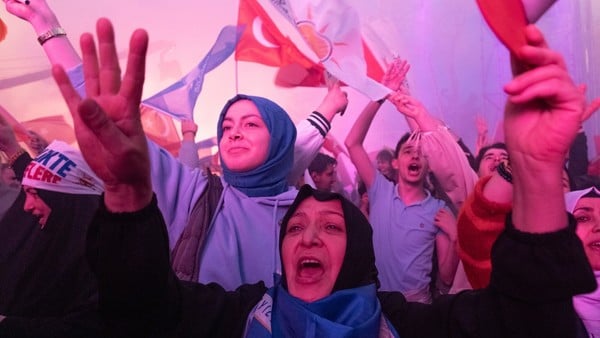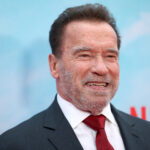Global Courant 2023-05-29 03:00:36
Inflation in Türkiye remains stubborn at 44%. Consumers have seen their paychecks buy less and less food as the months go by. And now, government largesse and efforts to prop up the currency threaten economic growth and could push the country into recession.
It is a difficult challenge for President Recep Tayyip Erdogan, the winner of the election, because his policies, including some aimed at securing his re-election, have exacerbated the problems.
“The relatively strong economy in recent quarters has been the product of unsustainable policies, so a contraction or recession is most likely,” said Brad W. Setser, global finance and trade expert at the Council on Foreign Relations.
“Turkish workers will feel poorer when the lira falls in value,” he said of the local currency. “People will find it more difficult to find a job and get a salary that covers the cost of living.”
The celebrations in Istanbul for the re-election of President Tayyip Erdogan. Photo Reuters
The fall of the coin
Economic turmoil in Turkey, one of the world’s 20 largest economies, could reverberate internationally due to the country’s extensive web of global trade links.
During Erdogan’s first 10 years in power, he oversaw spectacular economic growth that transformed Turkish cities and lifted millions out of poverty. But some of those gains have eroded in recent years.
The national currency has lost 80% of its value against the dollar since 2018. And annual inflation, which hit more than 80% at its peak last year, is down but was still 44% last month, leaving many feeling poorer.
While economic orthodoxy often calls for raising interest rates to combat inflation, Erdogan has insisted on doing the opposite, repeatedly lowering them, which economists say has exacerbated the problem.
During his re-election campaign, Erdogan showed no intention of changing his policies, doubling down on his belief that low interest rates would help the economy grow by providing cheap credit to boost Turkish manufacturing and exports.
“We will work tirelessly until we make Turkey one of the 10 largest economies in the world,” he told an election rally this month. “If today there is a reality in Turkey that does not allow its retirees, workers and civil servants to be crushed by inflation, we achieved it by standing back to back with you.”
Tayyip Erdogan has been in power for 20 years. Photo Reuters
In other rallies, he has promised to continue lowering interest rates and reducing inflation.
“You will see that as interest rates go down, so will inflation,” he told supporters in Istanbul in April.
In the run-up to the election, with the cost-of-living crisis on the minds of many voters, Erdogan launched a series of costly policies aimed at mitigating the immediate effects of inflation on voters. He has repeatedly raised the minimum wage, raised the salaries of civil servants, and changed regulations to allow millions of Turks to receive early government pensions.
All those commitments must be fulfilled, which means more government spending in the future.
reserves
The enormous damage caused by the powerful earthquakes that destroyed much of southern Turkey in February adds to the economic stress. In March, a government assessment put the damage at $103 billion, or about 9% of gross domestic product this year.
At the same time, the government has intervened heavily to stem the fall of the Turkish lira, mainly through the sale of foreign exchange reserves. During a week in early May, reserves fell by $7.6 billion to $60.8 billion, according to central bank data, the biggest such drop in more than two decades.
To address that, Erdogan has struck deals with countries including Qatar, Russia and Saudi Arabia that would help shore up reserves at Turkey’s central bank. Saudi Arabia announced a $5 billion deposit in March and Russia agreed to delay at least part of Turkey’s payment for natural gas imports until after the election.
The terms of most of these deals have not been made public, but economists said they were part of Erdogan’s short-term strategy focused more on winning elections than ensuring the country’s long-term financial health.
With Erdogan’s triumph, few expect him to drastically change course.
“I don’t think the current government has a plan to fix this because they don’t admit that these problems are due to policy mistakes,” said Selva Demiralp, an economics professor at Istanbul’s Koc University. “I don’t see a way out for the current government.”
If Erdogan sticks to the status quo, economists expect the currency to sink further, the government to impose restrictions on foreign currency withdrawals and the state to run out of hard currency to pay its bills.
In his campaign, the political opposition has vowed to pursue more orthodox economic policies, including raising interest rates to reduce inflation and restoring the independence of the central bank, whose policies are believed to be overseen by Erdogan himself.
In addition to complying with the additional spending added by Erdogan in recent months, a new administration should honor its financial agreements with other countries, the terms of which are unclear.
“What are the political terms? What are the financial terms?” said Kerim Rota, who is in charge of economic policy for the Gelecek Party, a member of the opposition coalition. “Unfortunately, none of those numbers are reflected in the Turkish statistics.”
“We need a very credible medium-term program, but the question is if the majority of parliament is on the AKP side, how can you manage a five-year program?” he said, using another name for Erdogan’s party.
The New York Times
PB








